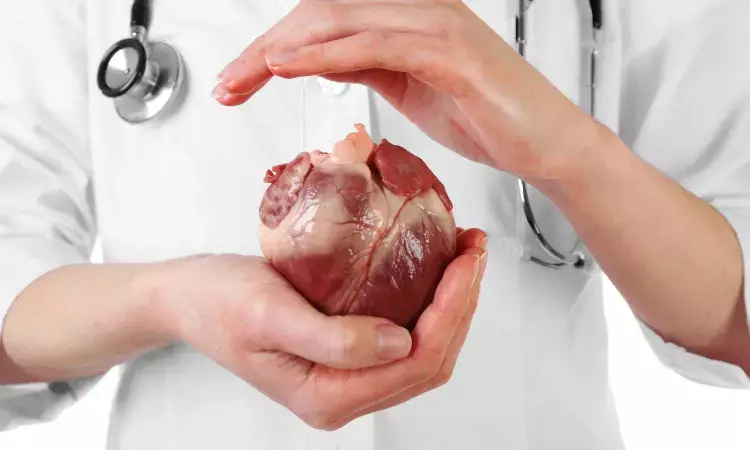- Home
- Medical news & Guidelines
- Anesthesiology
- Cardiology and CTVS
- Critical Care
- Dentistry
- Dermatology
- Diabetes and Endocrinology
- ENT
- Gastroenterology
- Medicine
- Nephrology
- Neurology
- Obstretics-Gynaecology
- Oncology
- Ophthalmology
- Orthopaedics
- Pediatrics-Neonatology
- Psychiatry
- Pulmonology
- Radiology
- Surgery
- Urology
- Laboratory Medicine
- Diet
- Nursing
- Paramedical
- Physiotherapy
- Health news
- Fact Check
- Bone Health Fact Check
- Brain Health Fact Check
- Cancer Related Fact Check
- Child Care Fact Check
- Dental and oral health fact check
- Diabetes and metabolic health fact check
- Diet and Nutrition Fact Check
- Eye and ENT Care Fact Check
- Fitness fact check
- Gut health fact check
- Heart health fact check
- Kidney health fact check
- Medical education fact check
- Men's health fact check
- Respiratory fact check
- Skin and hair care fact check
- Vaccine and Immunization fact check
- Women's health fact check
- AYUSH
- State News
- Andaman and Nicobar Islands
- Andhra Pradesh
- Arunachal Pradesh
- Assam
- Bihar
- Chandigarh
- Chattisgarh
- Dadra and Nagar Haveli
- Daman and Diu
- Delhi
- Goa
- Gujarat
- Haryana
- Himachal Pradesh
- Jammu & Kashmir
- Jharkhand
- Karnataka
- Kerala
- Ladakh
- Lakshadweep
- Madhya Pradesh
- Maharashtra
- Manipur
- Meghalaya
- Mizoram
- Nagaland
- Odisha
- Puducherry
- Punjab
- Rajasthan
- Sikkim
- Tamil Nadu
- Telangana
- Tripura
- Uttar Pradesh
- Uttrakhand
- West Bengal
- Medical Education
- Industry
Hearts donated after circulatory death lead to similar survival as donation after brain death: NEJM

USA: A recent study published in The New England Journal of Medicine has provided insights into the transplantation outcomes with donor's hearts after circulatory death
The randomized, noninferiority trial revealed that risk-adjusted survival at six months after transplantation with a donor's heart (that had been reanimated and evaluated with the use of extracorporeal nonischemic perfusion) after circulatory death was non-inferior to that after standard-care transplantation with a donor heart that had been preserved with cold storage after brain death.
Jacob N. Schroder, Duke University Medical Center, Durham, NC, and colleagues conducted a trial that included 180 adult candidates for heart transplantation. They were assigned in a ratio of 3:1 to receive a heart after the circulatory death of the donor or a heart from a donor after brain death if that heart was available first (circulatory-death group) or to receive only a heart that has been preserved with traditional cold storage after the brain death of the donor (brain-death group).
The study's primary endpoint was to determine the risk-adjusted survival at six months in the as-treated circulatory death group compared to the brain-death group. The primary safety endpoint was severe adverse events linked with the heart graft at 30 days following the transplantation.
The study led to the following findings:
- 90 (assigned to the circulatory-death group) of the 180 included patients who received a heart donated after circulatory death, and 90 (regardless of group assignment) received a heart donated after brain death.
- One hundred sixty-six transplant recipients were included in the as-treated primary analysis (80 received a heart from a circulatory-death donor, and 86 received a heart from a brain-death donor).
- The risk-adjusted 6-month survival in the as-treated population was 94% among heart recipients from a circulatory-death donor compared to 90% among heart recipients from a brain-death donor (least-squares mean difference, −3 percentage points).
- There were no substantial between-group differences in the mean per-patient number of serious adverse events associated with the heart graft 30 days after transplantation.
"Our findings showed that heart transplantation using the new donation strategy after circulatory death (DCD) led to similar 6-month survival in recipients as the traditional method of using hearts donated after brain death (DBD)," the researchers wrote.
"The randomized trial showing recipient survival with DCD to be similar to DBD should lead to DCD becoming the standard of care alongside DBD," they concluded. This could lead many more heart transplants to take place."
Reference:
The study "Transplantation Outcomes with Donor Hearts after Circulatory Death" was published in The New England Journal of Medicine.
DOI: 10.1056/NEJMoa2212438
Dr Kamal Kant Kohli-MBBS, DTCD- a chest specialist with more than 30 years of practice and a flair for writing clinical articles, Dr Kamal Kant Kohli joined Medical Dialogues as a Chief Editor of Medical News. Besides writing articles, as an editor, he proofreads and verifies all the medical content published on Medical Dialogues including those coming from journals, studies,medical conferences,guidelines etc. Email: drkohli@medicaldialogues.in. Contact no. 011-43720751


